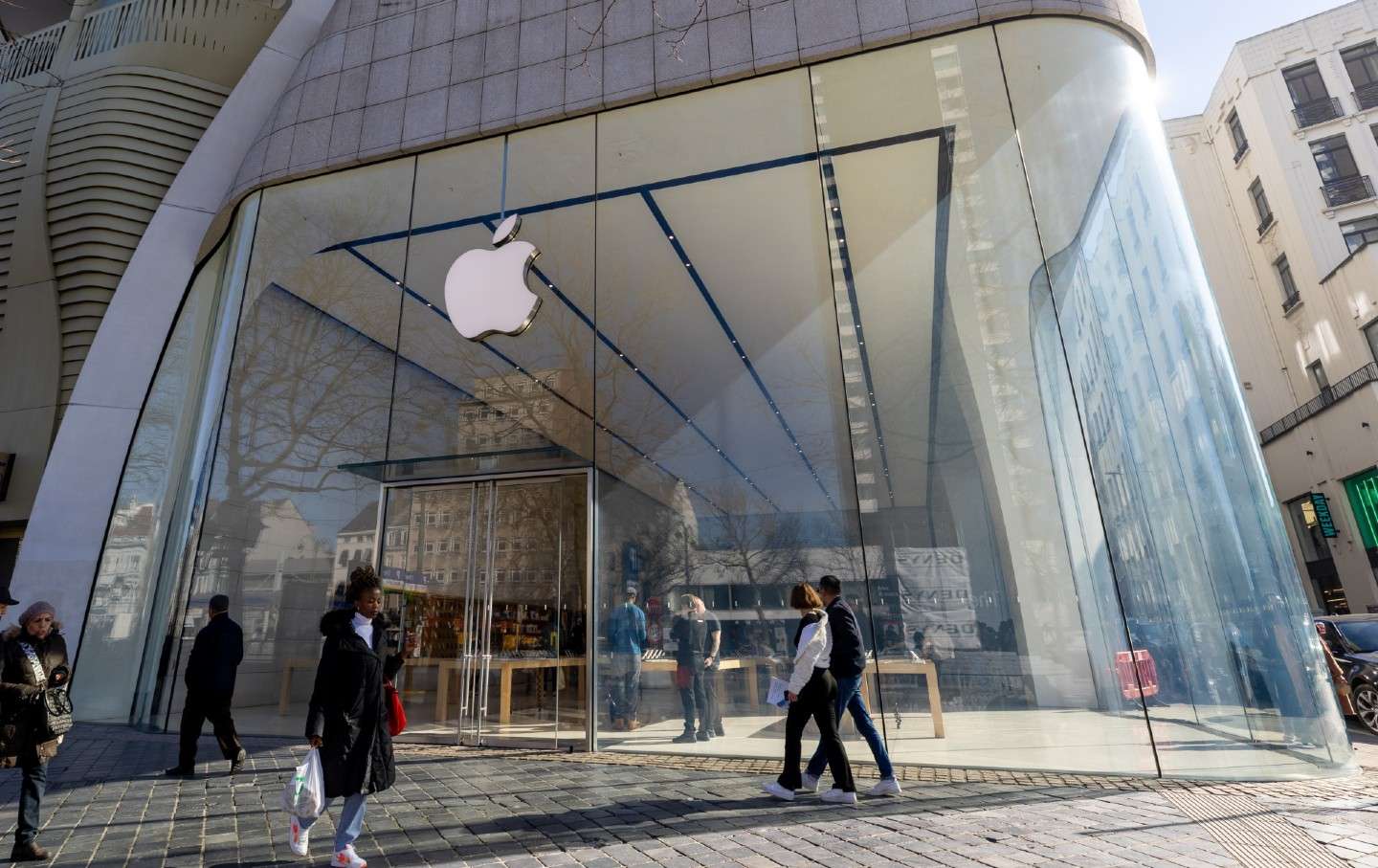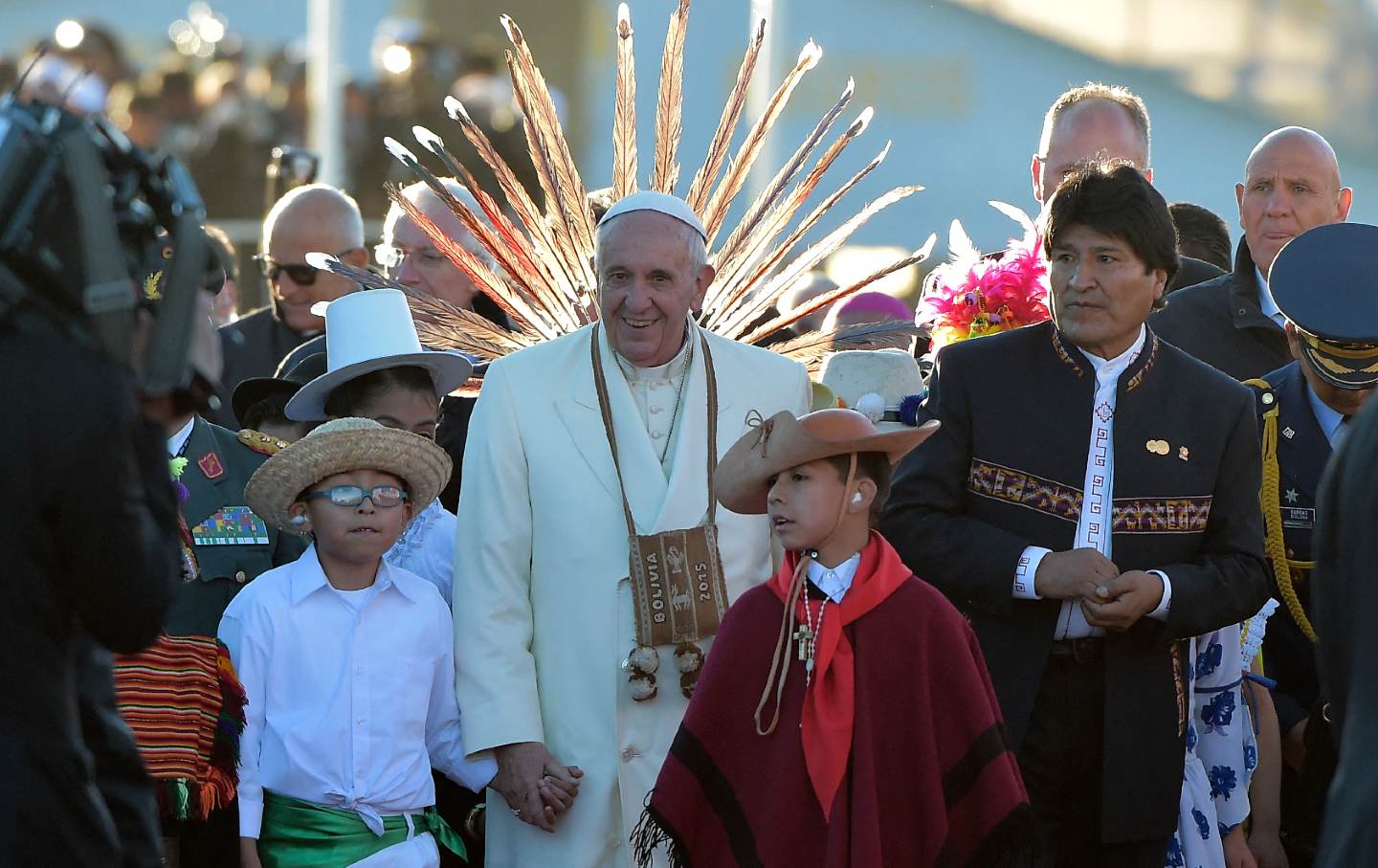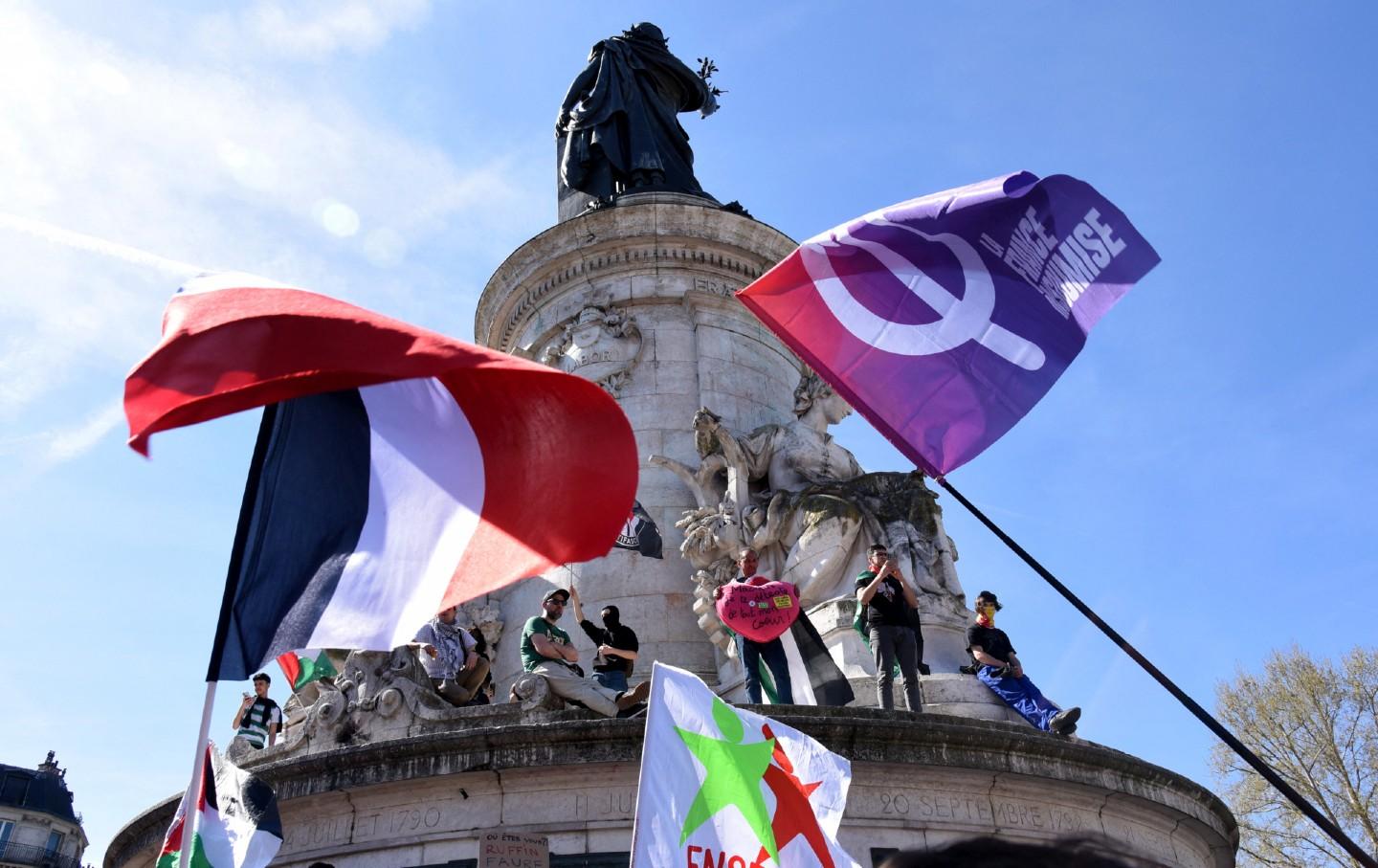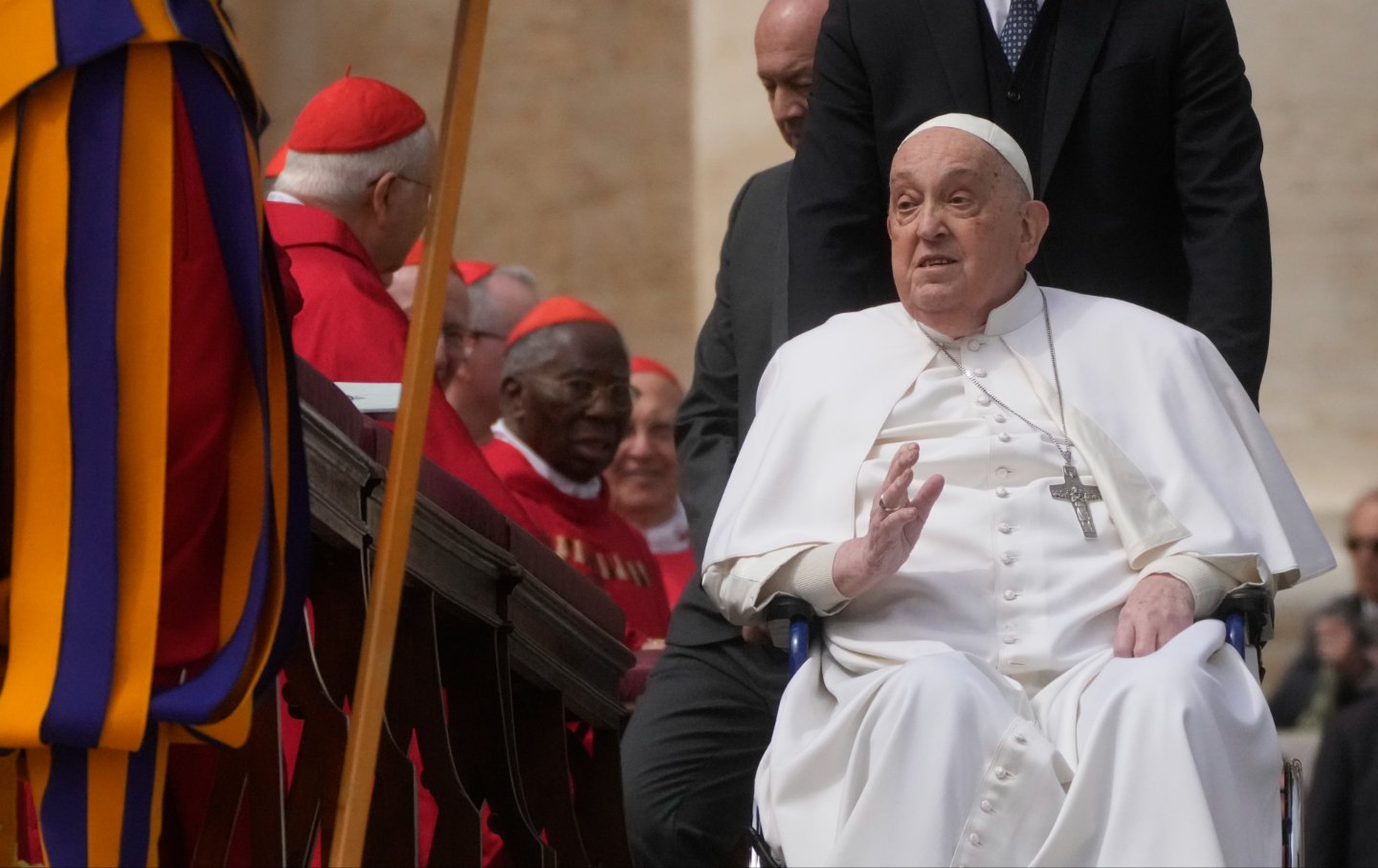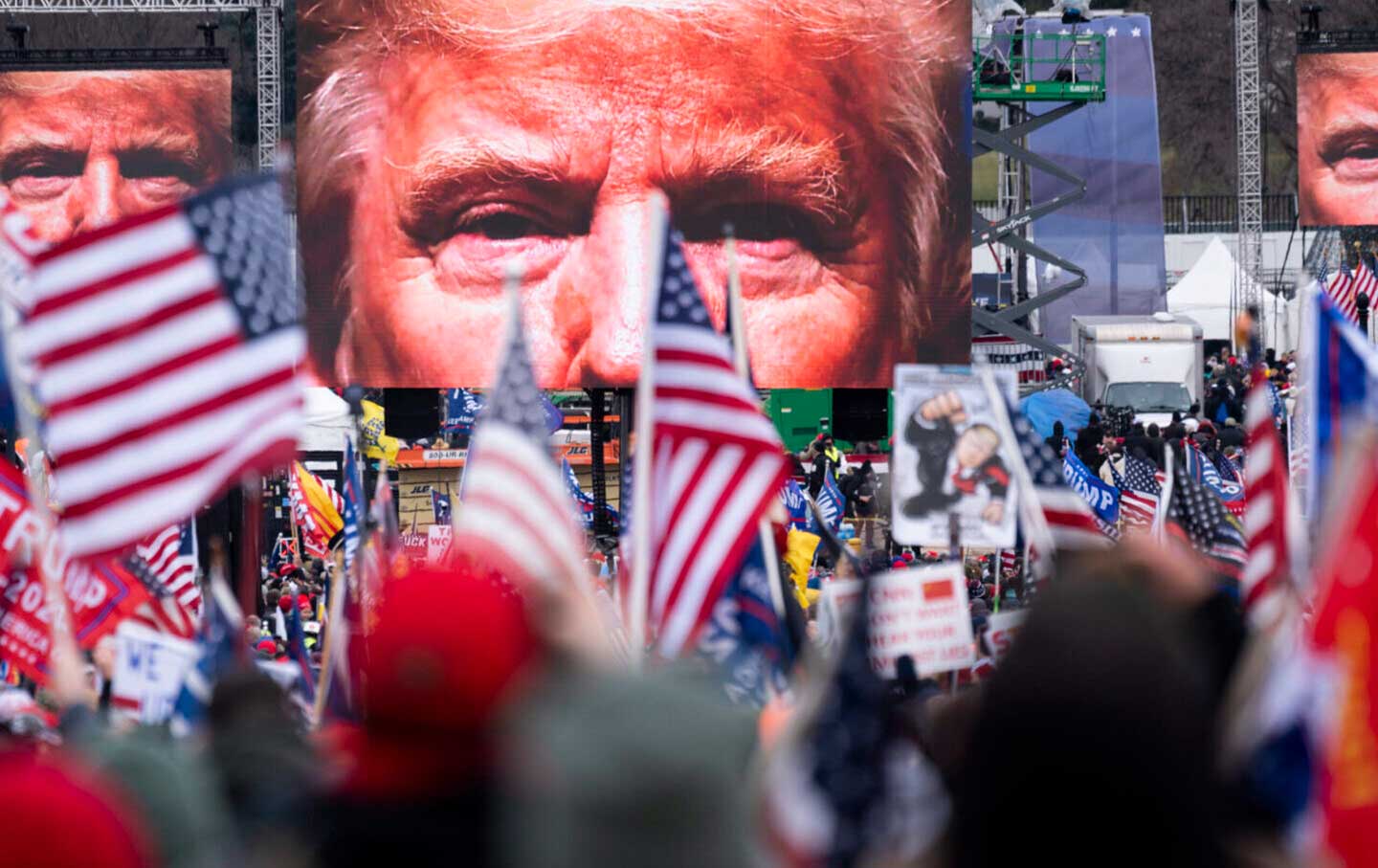In Rafah, We Are Waiting for the Worst
We had no reason to believe that Israel would care about our lives. We knew with certainty that the invasion would come.
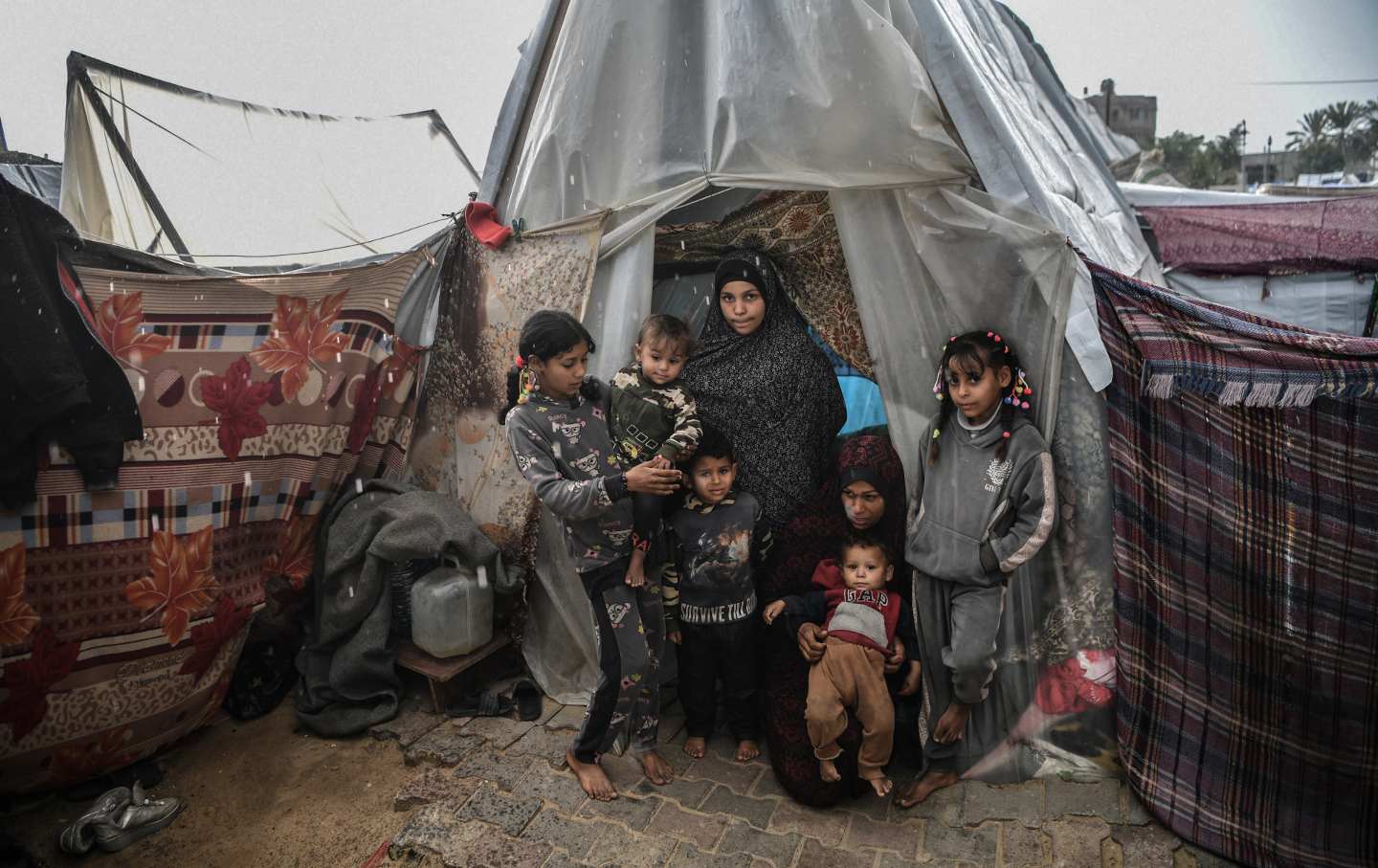
Palestinian families are seen among tents as they struggle with strong winds, downpours and floods while Israeli attacks continue in Rafah on February 15, 2024.
(Abed Zagout / Anadolu via Getty Images)Rafah, Gaza—Rafah is like a butterfly with weak wings. It clings to three international borders—the Mediterranean Sea extending to the west, the Egyptian border to the south, and the border with Israel to the east. It was never the most beautiful of cities. The streets remained ragged. No skyscrapers were erected in its center. But it has remained a gateway to Asia, a connection to Africa, a corridor for all civilizations.
Due to its central location, Rafah has also remained a victim of conflicts, invasions, and wars for decades. It was where the invasion of Egypt by Britain, France, and Israel began during the Suez Crisis of 1956. It was the point on whose borders the Israeli military confronted Egypt in the Six-Day War in 1967. And it has been repeatedly targeted by Israel since the First Intifada broke out in 1987. During the Second Intifada, it became a wide entry point for Israeli military movement from the southern border with Egypt, or what was known as the Philadelphia Axis, until the occupation forces withdrew from Gaza in 2005.
Rafah was always narrow and crowded. Its main street, which extends from its center to the seashore in the west, is no more than six kilometers, and all the neighborhoods, neighborhoods, and streets branch off from it. Its streets were always packed—with passersby and schoolchildren in the mornings, or with crowds and vendors flooding its central market at the beginning and end of the week. Rafah had a population of around 280,000 people before October 7. Nobody thought it could ever accommodate many more than that. But now there are over 1.4 million of us here.
People from every other part of Gaza took refuge in Rafah, which had been promised as a last safe haven. They jammed into tent cities, schools, and town squares, slept on sidewalks, found shelter anywhere they could.
Now, that supposed safe haven is in tatters. The Israeli government is planning to send its military directly into Rafah, and its bombs are already falling on us.
Because of this, people have been forced into an ever-smaller part of Rafah. The vast majority are now in the western parts of the city, an area not exceeding 40 square kilometers (or 15 square miles). The eastern third of the city, which borders Israel, has become virtually deserted, as people fear that this is where the occupation forces will make their way into Gaza when the hour strikes to invade.
To say that resources are stretched beyond capacity is an understatement. Shelters have come to resemble detention centers because of the overcrowding. One center that was planned to accommodate 1,200 displaced people has become a shelter for 12,000, with even more trying to get in because they have not found a place to sleep.
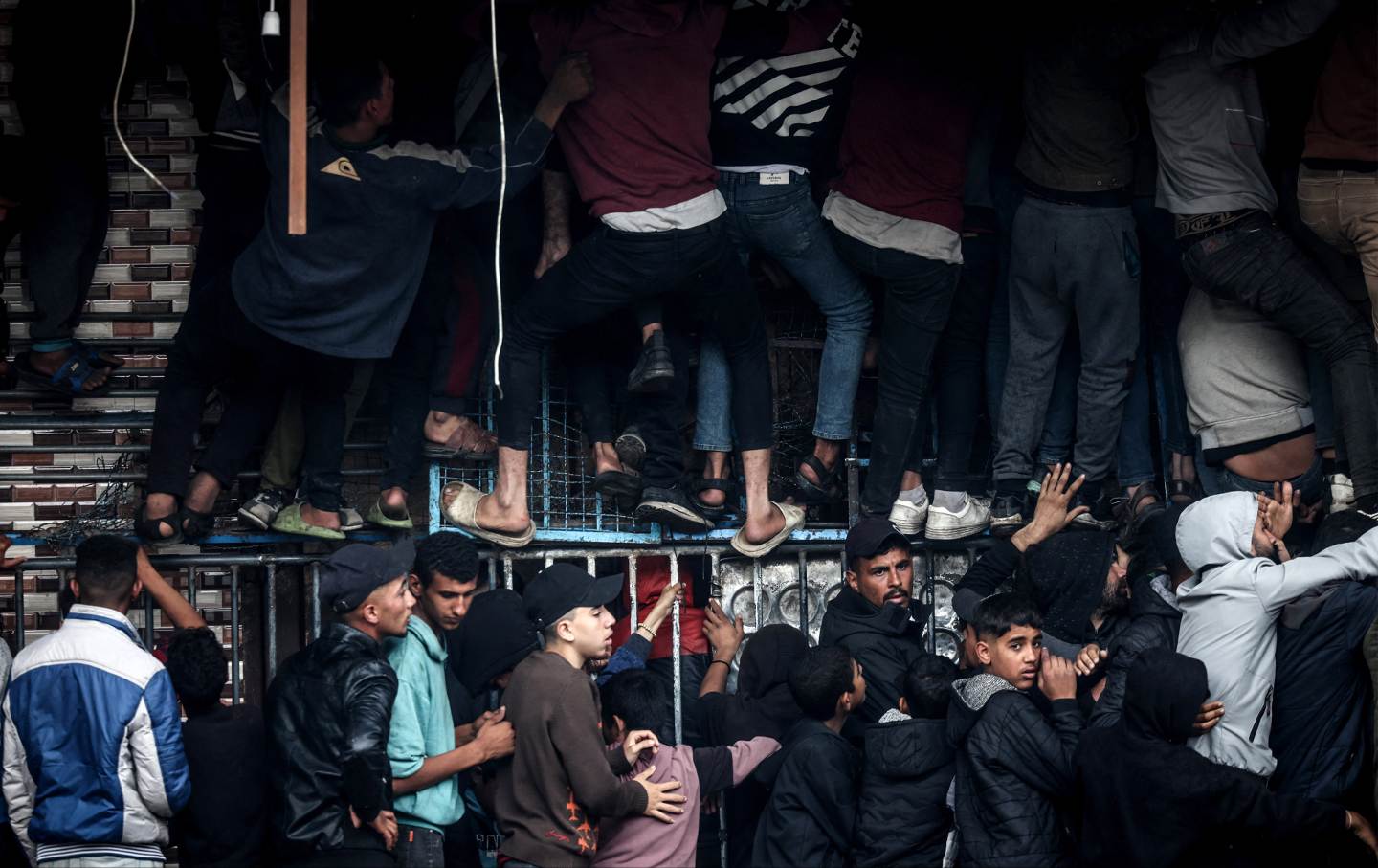
Rafah is wracked with tension, turmoil, and noise. People await the arrival of the occupying army just as bees watch from the holes of their hive for the beekeeper they know is coming to smoke them out and harvest their honey.
None of us can see a light at the end of the tunnel. We are in darkness and confusion, reading about truce negotiations at the same time as Netanyahu vows to turn the area into his latest graveyard. This has gone beyond being an ordinary war or even genocide. It is as though we are experiments in a workshop built to study the demolition of the Palestinian nation and the killing of its capabilities and dreams. The idea that we have dignity or human rights seems fanciful to our tormentors.
Like all people who do not choose what happens in war, and who are separated from the truth by a thick veil of falsification and obfuscation, the residents of Rafah—new and old—are abuzz with every piece of news transmitted by the various stations. They have been through too much, and been lied to too many times, to trust everything reported by the media. They think that Al Jazeera, for example, exaggerates the size of the resistance and its capabilities for goals sponsored by Qatari policy. They do not believe Israeli statistics about the number of occupation soldiers killed—though they do trust what is reported to them about internal Israeli political disputes and Israel’s relationship with all parties to the conflict. They no longer care about the comparison between what the resistance publishes and what comes out from between the jaws of the Israeli military censor’s scissors, what was deemed “allowed to publish.”
What concerns people more than any of this is the timing of the attack on Rafah—from which direction the tanks will advance, and which places the occupation army coordinator will declare to be safe—despite their knowledge that what the occupation declares as a safe place today will be a target for warplanes tomorrow. They are putting their faith in the news that activists strive to transmit through social media.
Updates about the locations of bombings, how many people have been martyred, and the names of the dead are more popular than political updates. Any talk of a truce, a cease-fire, or an exchange of prisoners is clung to. People know that their salvation from this nightmare will come only through an agreed-upon program, not from a bomb.
There are also many frightening discussions circulating about potential Israeli efforts to move people out of Gaza entirely and into Egypt—which is now building an eight-square-mile walled area that Egyptian officials say could be used to hold up to 100,000 refugees if they cross through Rafah.
The possibility of even temporary expulsion into Egypt inevitably brings up painful echoes of the Nakba. All Palestinians still dream of returning to the villages from which they were displaced in 1948, so the idea of migrating again is terrifying to many people. Others, however, are deciding that migration—for at least a little while—might be worth it if it keeps them away from the hell of bombing, killing, and destruction. It is unclear whether they really believe this, or whether they trying to convince themselves. The choice might turn out to be preserving the lives of their children as refugees in Egypt, or dying in Rafah.
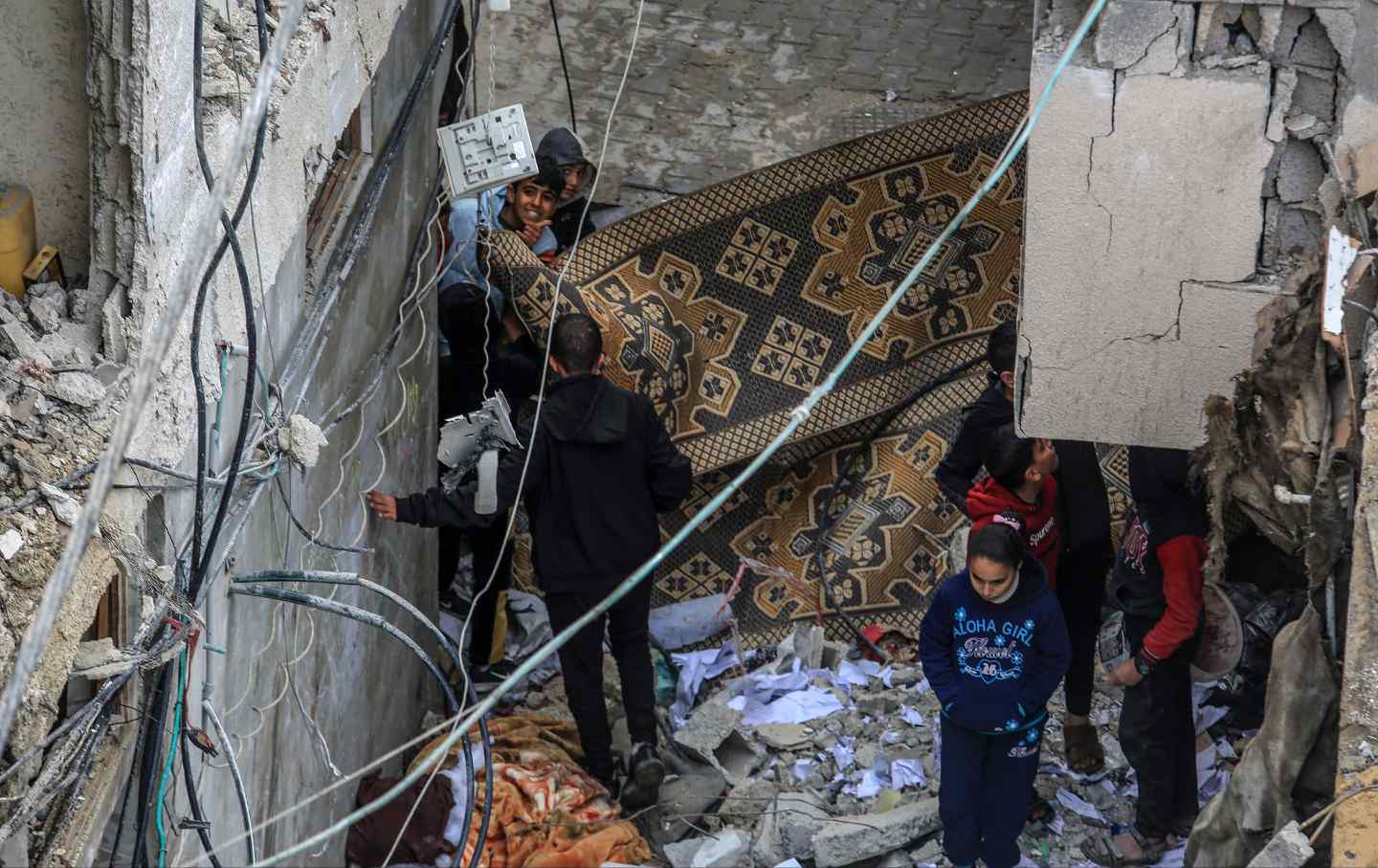
Though the impending invasion is a shock, it is not really a surprise. People in Rafah had no reason to believe that Israel would care about our lives. We knew with certainty that the invasion would come. So the series of searches began for tents distributed by some international institutions and for suitable places along the seashore, which people hoped might be safer than the city center or the neighborhoods near the Israeli border. People mostly try to stay away from the refugee camps that UNRWA established in the 1950s after the Nakba, because their old and dilapidated homes pose a greater danger to their residents, in addition to being more crowded.
Rafah’s landmarks have become crowded with street vendors of all ages displaying their wares from the contents of the aid boxes. This is not a totally new scene; the long years of siege that preceded the war prompted many to search for other sources of income, no matter how weak and few they were, and the streets and sidewalks turned into markets that sell canned goods and vegetables for 10 times their price. But now, people are selling part of the aid they receive to try and buy what the aid cannot provide. And what the occupation allows to enter does not exceed a 10th of what is needed by the 1.4 million people living here.
Popular
“swipe left below to view more authors”Swipe →For everyone else, there is not much to do but wait and think about the series of contradictions that life has become. People are waiting for where the occupation army will tell them to go next, even as they know that Israel will pursue them in those places and may bombard them on the way. They know that the invasion of Rafah will inevitably happen, and at the same time, they cling to any updates about truce negotiations and prisoner exchanges. They know that international regimes and institutions are warning against the invasion, but they also know that Israel will ignore these calls, and will pay no price. They know that the people of the world are in solidarity with them, but they also know that governments are cracking down on the movement for Palestine.
Above all, everyone in Rafah, and Gaza, knows that the world is governed by oil, gold, gas, racism, and empire. And they know that, just like so many other times over the decades, they are being ignored, even as the worst forms of organized state terrorism are used against them.
Therefore, people believe that the international community is obligated to exert more pressure on Israel and the American administration alike to put an end to this absurdity. If not, the continuation of this disastrous situation will create generations filled with extremism and hatred.
Hold the powerful to account by supporting The Nation
The chaos and cruelty of the Trump administration reaches new lows each week.
Trump’s catastrophic “Liberation Day” has wreaked havoc on the world economy and set up yet another constitutional crisis at home. Plainclothes officers continue to abduct university students off the streets. So-called “enemy aliens” are flown abroad to a mega prison against the orders of the courts. And Signalgate promises to be the first of many incompetence scandals that expose the brutal violence at the core of the American empire.
At a time when elite universities, powerful law firms, and influential media outlets are capitulating to Trump’s intimidation, The Nation is more determined than ever before to hold the powerful to account.
In just the last month, we’ve published reporting on how Trump outsources his mass deportation agenda to other countries, exposed the administration’s appeal to obscure laws to carry out its repressive agenda, and amplified the voices of brave student activists targeted by universities.
We also continue to tell the stories of those who fight back against Trump and Musk, whether on the streets in growing protest movements, in town halls across the country, or in critical state elections—like Wisconsin’s recent state Supreme Court race—that provide a model for resisting Trumpism and prove that Musk can’t buy our democracy.
This is the journalism that matters in 2025. But we can’t do this without you. As a reader-supported publication, we rely on the support of generous donors. Please, help make our essential independent journalism possible with a donation today.
In solidarity,
The Editors
The Nation

